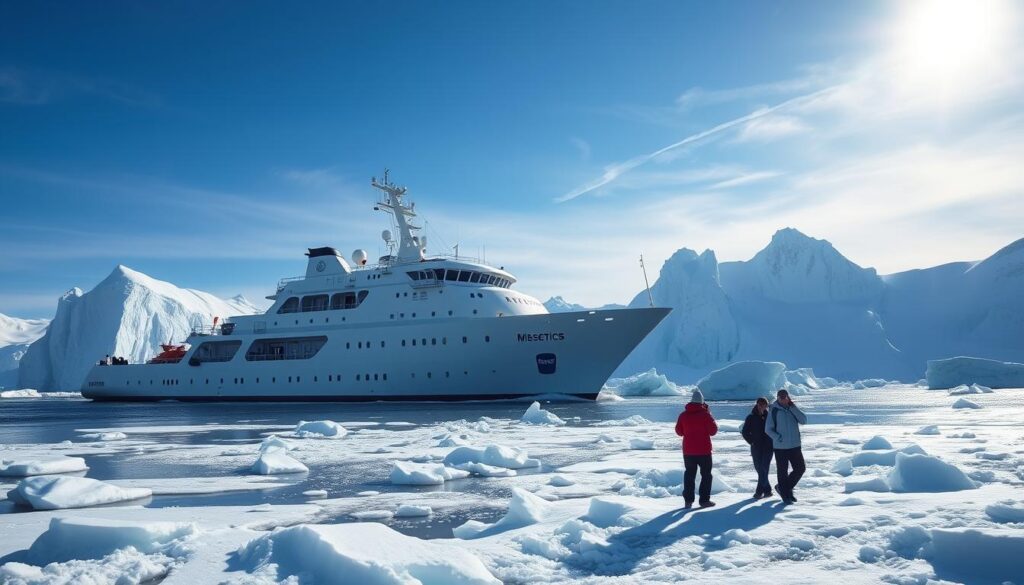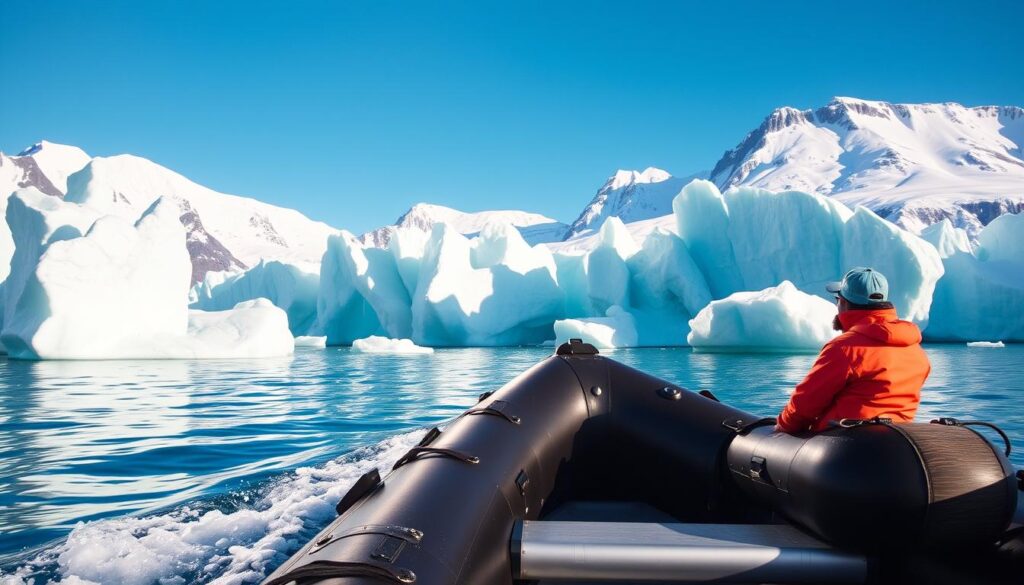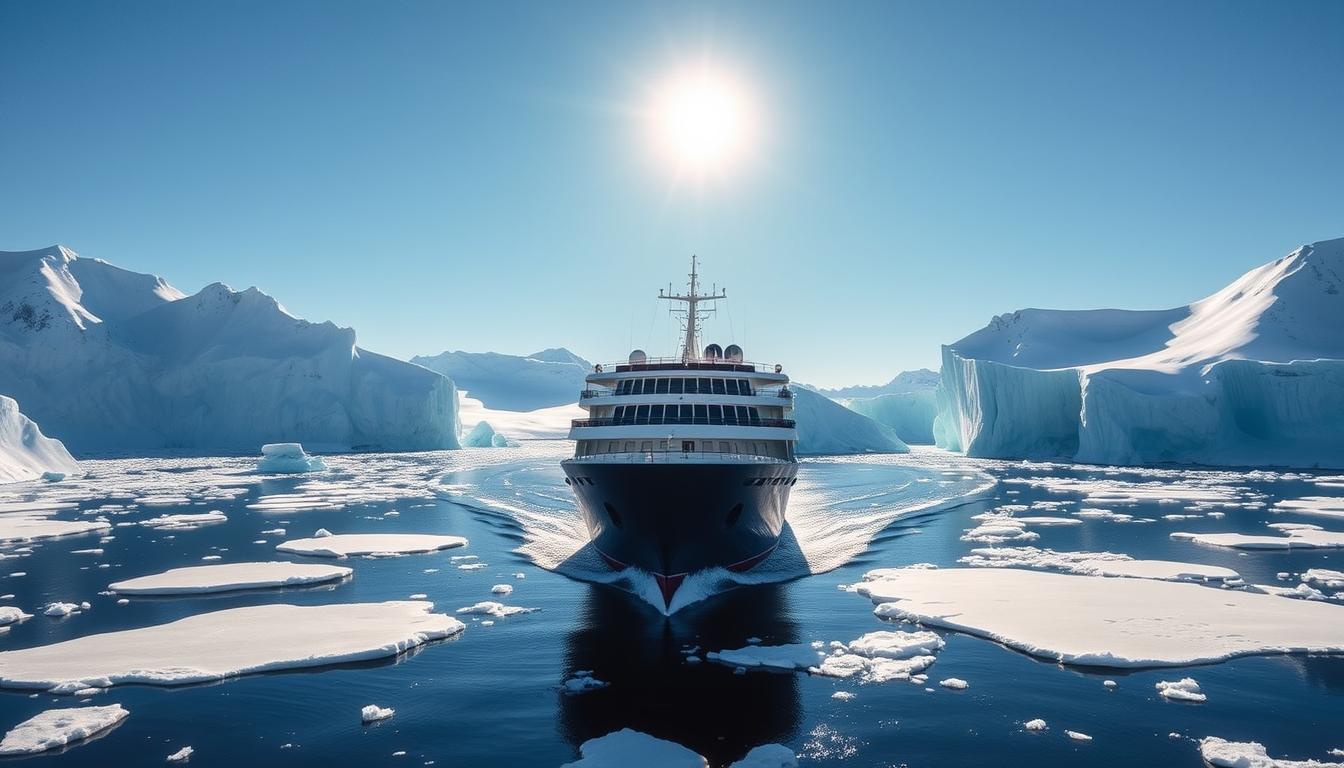Many dream of visiting Antarctica. It’s a place of massive glaciers and unique wildlife. You can see it all on an Antarctica tour, cruise, or expedition.
Planning a trip to Antarctica is important. You must pick the right tour, visit at the best time, and get ready for the cold. This guide will help you get ready for an amazing adventure in Antarctica.
Key Takeaways
- Antarctica tours offer unique opportunities to explore the frozen continent
- Various cruise and expedition options cater to different preferences
- Careful planning is crucial for a successful Antarctic journey
- Visitors must prepare for extreme weather conditions
- Antarctica travel provides unparalleled wildlife viewing and photography chances
- Responsible tourism practices are essential to preserve the Antarctic environment
Understanding Antarctica as a Travel Destination
Antarctica is the southernmost continent on Earth. It has beautiful landscapes and unique animals. Before you go, it’s important to know about this special place.
The Geography and Climate of Antarctica
Antarctica has huge ice sheets and high mountains. It’s bigger than Europe. The weather is very cold, sometimes as low as -128.6°F in winter.
But, antarctica adventures are worth it. They give you memories you’ll never forget.
Best Time to Visit Antarctica
The best time to visit is from November to March. The weather is a bit warmer and there’s more daylight. December and January are the best months to see animals and enjoy the outdoors.
Antarctic Treaty and Tourism Regulations
The Antarctic Treaty System helps protect the environment. Visitors must follow strict rules to not harm the ecosystem. This way, we can enjoy antarctica without hurting it.
“Antarctica is the last great wilderness on Earth. It’s our responsibility to preserve its beauty for future generations.”
Knowing about Antarctica will help you get ready for an amazing trip. Remember, budget-friendly travel tips can help make your dream trip to Antarctica possible.
How to Travel to Antarctica: Planning Your Journey
Planning a trip to Antarctica needs careful thought and prep. First, pick a good tour operator for polar trips. Look for ones with lots of experience and happy customers.
Then, learn about visa rules for your starting country. Most trips start in Chile or Argentina. Make sure you have your passport, travel insurance, and health papers ready early.
Getting to Antarctica is a big part of the adventure. You’ll fly to Ushuaia or Punta Arenas first. Then, you’ll sail for two days across the Drake Passage. Some trips offer flying instead of sailing, but it costs more.
“Antarctica is like no other place on Earth. The journey there is as much a part of the adventure as the destination itself.”
To enjoy your trip, pack the right stuff and learn about ship activities. Many tour operators give you lists and info to get ready for Antarctica’s unique climate.
| Planning Step | Timeframe | Importance |
|---|---|---|
| Choose Tour Operator | 12-18 months before | Critical |
| Book Expedition | 9-12 months before | High |
| Arrange Travel Insurance | 6-9 months before | Essential |
| Secure Visas | 3-6 months before | Necessary |
| Prepare Gear | 1-3 months before | Important |
By following these steps, you’re ready for an amazing Antarctica trip. Remember, good planning makes your journey safe and unforgettable.
Types of Antarctic Expeditions and Cruises
Antarctica trips have many options for adventurers. You can choose from luxury cruises to scientific expeditions. There’s something for everyone.
Luxury Antarctic Cruises
Luxury cruises offer comfort and luxury. These ships have big cabins, great food, and expert guides. You can see amazing views from your balcony while enjoying champagne.
Research Vessel Expeditions
Join scientists on research vessels for a unique experience. You’ll learn about Antarctic ecology and climate. You might help with data collection or watch marine life studies.

Adventure Tourism Options
Adventure lovers can choose from exciting trips. Activities include:
- Kayaking among icebergs
- Camping on the Antarctic Peninsula
- Scuba diving in polar waters
- Snowshoeing across pristine landscapes
These trips are for those who love adventure in the world’s most remote place.
Flying to Antarctica vs. Sailing
You can fly or sail to Antarctica. Flying is faster, skipping the Drake Passage. Sailing lets you see marine life slowly. Think about what you want and your budget for your trip.
Choosing Your Antarctic Gateway City
Starting your journey to Antarctica begins with picking the right city. These cities are key for getting to Antarctica. They offer special experiences before your icy adventure starts.
Ushuaia, Argentina, is known as the “End of the World.” It’s a busy port city with beautiful views of the Beagle Channel. It’s a key spot for getting to the Drake Passage.
Punta Arenas, Chile, has a rich history. It’s a great place to start for flights to Antarctica. Hobart, Australia, is a gateway to the eastern part of Antarctica and the Australian Antarctic Territory.
| Gateway City | Country | Main Features | Expedition Types |
|---|---|---|---|
| Ushuaia | Argentina | Southernmost city, Tierra del Fuego National Park | Cruise ships, sailboats |
| Punta Arenas | Chile | Magallanes Regional Museum, Strait of Magellan | Fly-cruise options, research vessels |
| Hobart | Australia | MONA museum, Mount Wellington | Icebreaker cruises, scientific expeditions |
Each city has its own benefits. Ushuaia is the closest by sea. Punta Arenas is great for fly-cruise options. Hobart offers unique paths to eastern Antarctica.
Think about travel time, what to do before you go, and where you want to go in Antarctica. This will help you choose the best city for your adventure.
Essential Gear and Packing List for Antarctica
Getting ready for adventures in Antarctica needs careful planning. You must pack the right stuff for a good trip. Here’s what you’ll need for your amazing journey.
Clothing and Layering Requirements
Staying warm in Antarctica is all about layering. Begin with a moisture-wicking base layer. Then, add an insulating middle layer. Finish with a waterproof outer layer.
Don’t forget warm socks, waterproof boots, and insulated gloves. A warm hat and neck gaiter are key to fight off icy winds.
Photography Equipment
Take amazing photos with the right gear. Bring a weather-sealed camera, wide-angle and telephoto lenses, and lots of memory cards. A sturdy tripod is great for windy days.
Remember extra batteries. Cold weather uses them up fast.
Medical and Safety Supplies
Have a full first-aid kit and any personal meds. Use sunscreen and lip balm with high SPF to protect against UV rays. If you get seasick, bring medicine.
| Category | Essential Items |
|---|---|
| Clothing | Thermal underwear, fleece jacket, waterproof parka, insulated pants |
| Accessories | Waterproof gloves, warm hat, neck gaiter, sunglasses |
| Footwear | Waterproof boots, wool socks, grip-enhancing ice cleats |
| Photography | Weather-sealed camera, wide-angle lens, telephoto lens, tripod |
| Health & Safety | First-aid kit, high SPF sunscreen, lip balm, seasickness medication |
Cost Breakdown and Budgeting Tips
Planning a trip to Antarctica needs careful money planning. Prices for Antarctica trips vary a lot. This depends on how long you stay, what you get, and where you go. Knowing these costs helps you plan your budget for your adventure.
Cruise and Expedition Prices
Antarctica trips start at about $5,000 for a basic 10-day cruise. Luxury trips can cost over $30,000 per person. These prices usually include where you stay, food, and some activities. Longer trips or those to far places like the Ross Sea cost more.
| Expedition Type | Average Price Range | Duration |
|---|---|---|
| Basic Cruise | $5,000 – $10,000 | 10-14 days |
| Mid-Range Expedition | $10,000 – $20,000 | 14-21 days |
| Luxury Adventure | $20,000 – $30,000+ | 21+ days |
Additional Expenses to Consider
When planning your trip, remember extra costs. This includes flights, insurance, and renting gear. Activities like kayaking or camping cost extra. Also, think about souvenirs and tips for the crew.
Ways to Save on Antarctic Travel
To save money, look for last-minute deals or travel in the shoulder season. Choosing a shared cabin or a shorter trip can also help. Some places offer discounts for early bookings, so plan ahead to save.
By thinking about these things and planning early, you can make a good budget for your trip. This way, you can enjoy your Antarctic adventure without spending too much.
Health Requirements and Physical Preparation
Planning antarctica tours needs careful health checks and being in shape. Before going, check your fitness and health.
Most expedition companies ask for a medical form. Your doctor will check your heart health and how well you move. They might suggest shots for common sicknesses. But, Antarctica doesn’t need special shots.
Getting fit is important for a great trip. Start exercising a few months before. Focus on:
- Cardiovascular endurance
- Balance and stability
- Upper body strength for Zodiac boat activities
Don’t forget to pack medicine for seasickness. The Drake Passage can be very rough. Talk to your tour about any health issues.
Antarctica tours mean walking on uneven paths and getting in and out of boats. Working on your leg strength and practicing these actions will make your trip safer and more fun.
“Preparing your body for Antarctic conditions ensures you can fully immerse yourself in the breathtaking landscapes and wildlife encounters.”
Focus on your health and fitness for an amazing Antarctica adventure.
Wildlife Encounters and Photography Opportunities
Antarctica offers amazing wildlife viewing and photography. Its clean landscapes and special animals are a dream for nature lovers and photographers.
Penguin Species and Colonies
Antarctica has many penguin species. You can see Adélie, Chinstrap, and Gentoo penguins. Emperor penguins live in the farthest places.
Colonies can have thousands of penguins. They make great sights and sounds.
Marine Mammals
The Antarctic waters are full of marine life. You’ll see seals like Weddell, crabeater, and leopard seals on ice. Whale watching is a big part of antarctica adventures.
You might see humpback, minke, and orca whales.
Bird Photography Tips
Getting the perfect shot of Antarctic birds takes patience and planning. Use a telephoto lens to get close without disturbing them. Here are some tips:
- Shoot in burst mode to capture birds in flight
- Use a fast shutter speed to freeze action
- Focus on the bird’s eye for engaging portraits
- Frame your shots to include the surrounding landscape
| Wildlife | Best Viewing Season | Photography Challenge |
|---|---|---|
| Penguins | November – February | Capturing group dynamics |
| Whales | February – March | Timing breaches and flukes |
| Seals | December – January | Blending with ice backgrounds |
| Seabirds | October – March | Freezing fast-moving subjects |
Onboard Life and Daily Activities
Life on antarctica cruises is full of adventure and comfort. Your days are packed with fun activities and learning. You’ll enjoy exciting excursions and educational programs.
Zodiac Excursions
Zodiac boats let you see Antarctica’s beautiful landscapes up close. These boats take you near icebergs and remote shores. You might see seals or penguins in their natural habitat.

Lectures and Education Programs
Antarctica expeditions have lots of learning opportunities. Experts talk about wildlife, geology, and history. These talks help you understand the continent better.
Dining and Entertainment
Meals on antarctica cruises are a big deal. Chefs make tasty dishes with fresh ingredients. You can choose from many dining spots. Evening fun includes music, movies, or stargazing.
| Time | Activity | Description |
|---|---|---|
| 7:00 AM | Breakfast | Buffet-style meal with hot and cold options |
| 9:00 AM | Zodiac Excursion | Explore ice formations and wildlife |
| 1:00 PM | Lunch | Three-course meal with regional specialties |
| 3:00 PM | Lecture | Topic: Antarctic marine ecosystems |
| 7:00 PM | Dinner | Gourmet dining with wine pairings |
| 9:00 PM | Entertainment | Live music or documentary screening |
Environmental Responsibility and Conservation
Planning a trip to Antarctica means you must care for the environment. This icy continent is very special and needs our protection. Holidays here mean we must look after the unique ecosystem.
IAATO Guidelines
The International Association of Antarctica Tour Operators (IAATO) has strict rules for visitors. These rules help keep the Antarctic environment and wildlife safe. Tourists must follow rules on waste, wildlife, and biosecurity.
Minimizing Your Environmental Impact
Choose eco-friendly tour operators to lessen your impact. Use products that break down easily and avoid plastics. Keep a safe distance from animals and never leave trash behind. These steps help protect this special place for others to see.
Remember, being responsible is crucial when visiting Antarctica. Your actions can greatly help preserve this untouched wilderness.


